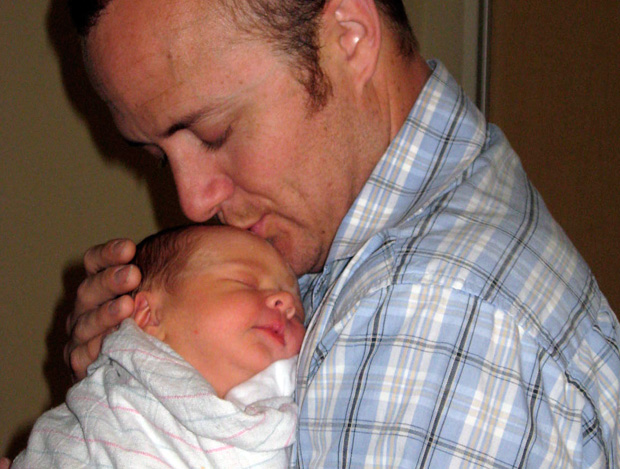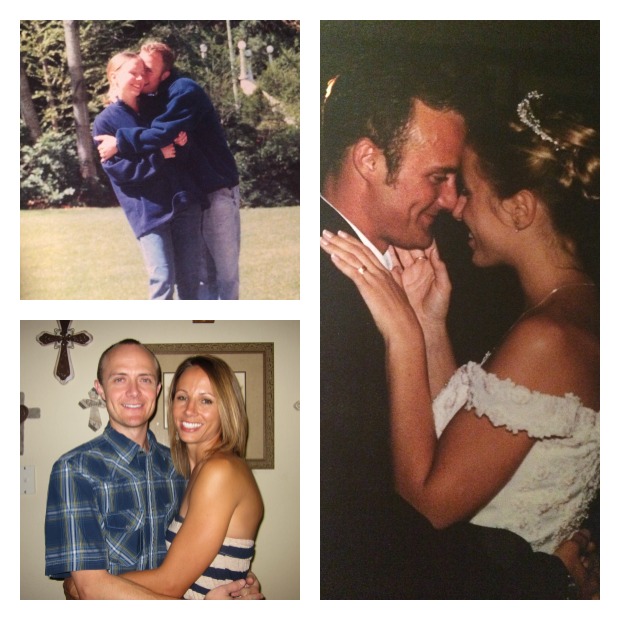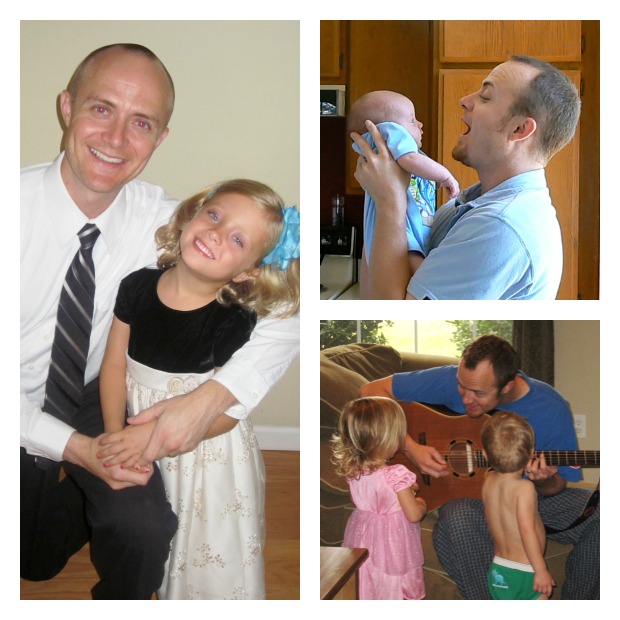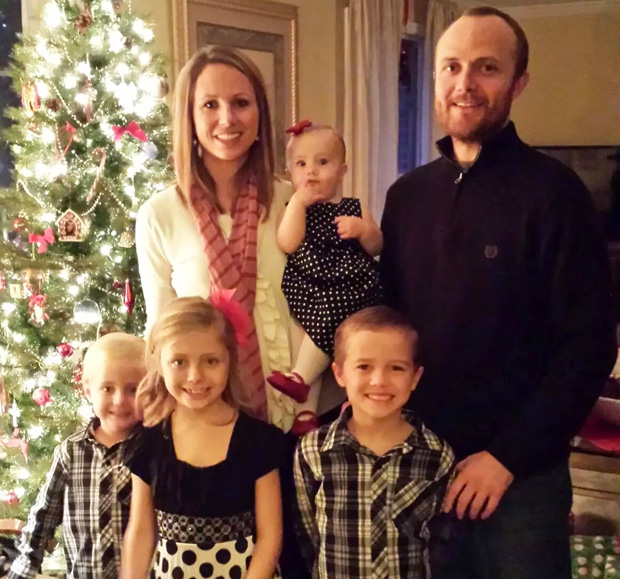My husband was diagnosed with Alzheimer’s — at 36
01/13/2016 / By Julie Wilson

What would you do if the man you adored started regressing before your eyes? Kamara Manthe shares her brave story.
Note: The following article originally appeared in the January 2015 issue of Good Housekeeping.
If I had known that every day I would lose a piece of Jason, a lot of our days might have been different. Maybe I would have not cared so much about the small stuff. Treasured each moment. Loved him more. But I just didn’t know.
The first time I saw Jason, he was playing the guitar in the band at church at our college. I was a freshman and he was a junior. He was really cute; he had these big blue eyes and great dimples. We went on a weekend retreat with our youth ministry group, and I came back thinking he was so funny. Afterward, I wrote in my journal, I think I met the guy I want to marry.
Jason was so romantic; he’d buy me flowers and write me notes. Most people just sign their names in cards, but he’d underline parts. I saved every ticket for every movie, concert, and church program we went to and put them in a memory box, my box of treasures.
 After we’d been dating a year, we started talking about marriage. We talked about getting old together, having a house with the white picket fence, and lots of grandkids. It’d be Jason and me sitting in rocking chairs on the porch. Around Christmas 2001, we went to Jason’s dad’s house to exchange gifts. When I walked in, I was stunned. Jason had decorated a Christmas tree with 100 lights and about 50 red roses. He sang a song he’d written for me: “I never believed it could happen to me / I’ve heard it in songs and I’ve watched it on TV / Now I’ve met you and all is complete…”
After we’d been dating a year, we started talking about marriage. We talked about getting old together, having a house with the white picket fence, and lots of grandkids. It’d be Jason and me sitting in rocking chairs on the porch. Around Christmas 2001, we went to Jason’s dad’s house to exchange gifts. When I walked in, I was stunned. Jason had decorated a Christmas tree with 100 lights and about 50 red roses. He sang a song he’d written for me: “I never believed it could happen to me / I’ve heard it in songs and I’ve watched it on TV / Now I’ve met you and all is complete…”

At the end of the song, he proposed. “There’s no one I’d rather spend my life with,” he said. Of course I said yes. I couldn’t imagine not being married to Jason. I was 25 when I got pregnant with Mya and Matthew, our twins. During our first sonogram, when two circles showed up instead of one, Jason turned white as a sheet. “Two!” he said. He was so excited.
When I was put on bed rest at 27 weeks, Jason was amazing. He’d go to the store, cook dinner, and play board games with me afterward. And he was so protective. If I tried to get up to brush my teeth, he’d say, “No! I’ll bring it to you!”
After the twins were born, Jason cared about the smallest details. I kept a tight schedule, and Jason was wonderful about all of it, from diaper changes to bedtime. He’d read to them and, when they got older, rolled around with them, wrestling. He videotaped every minute of their lives. Before putting them down, I’d go in and see him snuggling with them, singing.
A Different Man
I started to notice changes in Jason in 2009, after the birth of our third child, Noah. First he began to lose interest in his job. For eight years, he’d been one of the most beloved teachers at his school. He adored working there. Then, just like that, he wanted to quit. People were shocked, and so was I.
I wanted him to be happy, so I supported him. He decided to work for the fast-food chain Chick-fil-A, which is run by Christian owners, with the goal of becoming a franchise operator. Then, a couple of months in, Jason switched gears again. This time he wanted to try out for our town’s police department.
At first, I was encouraged. Jason seemed to like the challenge. But soon I learned that he was struggling. Some of the wives of guys at the academy said their husbands would joke about how easy it was, but Jason always complained that the work was difficult. His bosses told him to write his patrol reports faster, which stressed him out; he started losing weight and became anxious. “I can’t do this,” he’d say. Sometimes he’d cry before shifts, which was weird because he’d never been a crier.
After about 11 months, Jason quit the police, too. Around that time, he came down with a skin infection after getting a mole removed. He had to be in the hospital for two weeks. That’s when I noticed him saying strange things. The nurses would ask, “How did you get this infection?” and he’d answer, “I’ve had two doses this morning.” We chalked it up to his meds, but I worried.
Soon Jason began to struggle with memory. He’d been a football and basketball coach when he was a teacher, so he decided to help a friend running a sports program for preschoolers. But Jason couldn’t keep the schedule straight. He had to write notes on his hand to remember when and where to show up. And his forgetfulness got worse. Once Jason was driving us to a baseball game and went the wrong way down a one-way road. Another time, he walked Mya across the street for a playdate and got lost coming back. The police brought him home.
Around Christmas 2012, Jason went outside to put the lights on the house, a job that usually took an hour; he spent four hours on it, then chucked them into the garage. “These stupid lights!” he yelled. I remember him putting his face in his hands and asking, “Why is this happening to me?” He looked so broken.
Questioning everything
I had never doubted our marriage, but by then I knew something was wrong. Jason blamed me for things, saying that I was too hard on him. At times, I thought, maybe it’s me. We were barely talking. He’d also gone from being a doting dad to being indifferent. I had become pregnant with our daughter Kinsley, but he stopped going to my ob-gyn appointments with me. Before, for our kids, hanging with Daddy had meant good times; at bedtime, I’d be trying to calm them down and he’d be riling them up. Now I had to tell him to go play with them.
Divorce had never crossed my mind, but I started thinking about it. We saw a counselor. Privately I told the therapist what was happening, and he recommended that we see a neuropsychologist. That appointment led us to a neurologist, and that led to a dozen other appointments and tests. Ultimately our neurologist helped us get an appointment with the Mayo Clinic, in Minnesota. In October 2013, we went. Jason went through days of tests, including PET scans of his brain. The night before our meeting with his doctor, I logged in to his online Mayo patient records and saw his results. I don’t remember the exact words, but the message said that his brain images were consistent with those of someone with Alzheimer’s. It felt like someone had punched me. Lord, I prayed, panicking, please help us through this. I jumped on Google. No one in Jason’s family had had Alzheimer’s. I just couldn’t understand.
I fell asleep with a sliver of hope that it wasn’t true. But at Jason’s appointment, the doctor confirmed it. Later, I asked Jason if he understood. He didn’t respond, just nodded and cried. That night, we held each other. I tried to sleep, but all I could think of was how we were going to handle it.
At home, we sat the kids down. “We found out what’s wrong with Daddy,” I said. “He’s not going to get better.” They cried, but I don’t think they understood what it meant until months later. When that day came, Matthew asked, “Wait, do you mean Daddy will die?” I had to say yes. “We all die eventually,” I said. “Only God knows when. But we can’t worry about it. We’re just going to love Daddy.”
Finding ways to hold on
After the Mayo visit, Jason began to forget how to take care of himself, like how to shower. I showed him and he copied what I did, scrubbing his head, lathering his body. Over time, I began doing it for him. Then we switched to baths.
In time, Jason lost the ability to speak. I remember the first day he didn’t know my name, and the day when we were looking at pictures and he couldn’t remember the names of our kids. That was one of our worst days ever.
Jason’s doctors told us he couldn’t be alone anymore, so we found a day care facility for him nearby. Our days were crazy: I’d get up at 4:45 a.m. to get the kids and Jason dressed and ready for the day. I’d leave at 6:45 a.m., drop off Kinsley at her day care and Jason at his, then head to our kids’ school, where I also taught. My coworkers were making dinner for us two nights a week; I’d stretch the leftovers to cover four nights. Then we’d do baths and bedtime. Around 11 p.m., I’d climb in next to Jason and usually fall asleep crying.
Jason’s day care was too expensive to afford on my teacher’s salary. At one point, I applied for food stamps and was on the Special Supplemental Nutrition Program for Women, Infants, and Children (WIC). That’s where our community saved us. A friend held a fund-raiser and put it on Facebook, which triggered more events: a garage sale, a spaghetti dinner, a fund-raiser at Jason’s day care. We raised thousands of dollars.
Whenever I’ve felt sad, someone has done something amazing. Last Valentine’s Day, people brought me gifts at school. My friends from Arizona came out for my birthday. For a while, every week someone came over to stay with Jason so I could go do something for myself. A neighbor pays to have my lawn mowed, and my church covers my therapy sessions, which are discounted by my doctor. It’s by the grace of God that we’re where we are now.
Seeing their daddy get sicker was weighing on the kids, so in April I decided to put him into long-term care. In May, my mother-in-law moved in with us; she spends every day with Jason. I take the kids to see him once or twice during the week, sometimes on a Saturday and always on Sunday after church. While the kids play outside, I sit with him. We look at pictures and I tell him stories about life at home. I can still make him laugh. I give him a look, nudge, or grab his knee, and he’ll smile.
The way we were
The kids understand that we don’t know how much longer we’re going to have Daddy. I answer their questions as honestly as I can. Matthew and Noah were jumping on the trampoline the other day when I heard Matthew say, “Don’t hit me too hard on the head. I don’t want my Alzheimer’s to come out.” I think about that. I don’t want them to be afraid.
I’m trying to help them remember their dad the way he once was. Matthew loves to impersonate characters like Grover from Sesame Street. Jason used to be great at doing voices, so I’ll say, “That’s something you get from Daddy.” At Jason’s facility this summer, the staff asked the kids to share a memory. Mya talked about the daddy-daughter dance she went to with Jason last February. They slow-danced to “Butterfly Kisses.” She said it was the best night of her life.
Follow this link to read the rest of the article.
Source used:
Submit a correction >>
Tagged Under:
Aluminum, Alzheimer's disease, Good Housekeeping
This article may contain statements that reflect the opinion of the author























